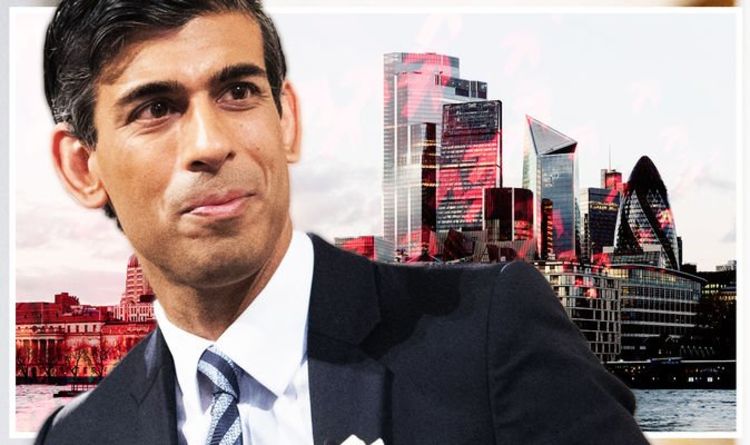Martin Lewis talks about rising interest rates on mortgages
We use your sign-up to provide content in ways you’ve consented to and to improve our understanding of you. This may include adverts from us and 3rd parties based on our understanding. You can unsubscribe at any time. More info
The UK’s public finances could face a £50billion deficit because of rapidly increasing debt interest costs over the next five years. The interest rate rise will increase the costs of servicing Britain’s £2.2trillion public debt. Chancellor Mr Sunak’s hopes for a rebounding economy could be crippled by the UK’s central bank’s interest rate hike in response to inflation.
Speaking to the Daily Telegraph HSBC economist Elizabeth Martin said: “The higher debt service spending reduces the Chancellor’s room for manoeuvre going forward.
“This is particularly in conjunction with the new borrowing rules he is set to announce.”
Although Mr Sunak has heralded the UK as commencing a post-lockdown economic recovery, Deutsche Bank economist Sanjay Raja told the Daily Telegraph that “persistent excess inflation could wipe away some of the gains accrued so far this fiscal year”.
The news comes after investors in financial markets are bracing for a string of interest rate rises in 2022.

The Bank of England’s new chief economist Huw Pill warned that inflation in the UK is set to climb “close to or even slightly above 5 percent” in early 2022.
The Office for Budget Responsibility, OBR, has stated that debt servicing of the UK’s public finances will amount to £52 billion over the next five years.
The Institute for Fiscal Studies has estimated that debt interest spending will be £15billionn a year higher than previously expected.
In its annual “green budget”, published yesterday, the Institute for Fiscal Studies said that the Chancellor would have to factor in a hike in government borrowing costs because of rising interest rates.

The organisation said this would frustrate the gains made in the UK’s recent economic growth.
The financial sector and product supply chain industries have already begun to factor in the imminent interest rate hike.
This has resulted in rising prices of goods and services in the British economy.
Energy bills, grocery bills and other household costs are rising and the most recent figures show that prices rose by an average of 3.1 percent over the past 12 months.
DON’T MISS:
Britons turn heating OFF for winter as energy bills hit record highs [GUIDE]
Pensioners who claim this ONE key State benefit get SIX more [ANALYSIS]
Don’t be scared of the stock market crash. Be more aggressive [REVEAL]

The Bank of England now thinks the figure could go above 4 percent by December.
The Organisation for Economic Cooperation and Development, OECD, has stated that shipping costs, labour shortages and supply chain problems are pushing up inflation in the UK.
A spokesperson for the OECD said: “Shortages and labour market mismatch are at least to an extent compounded by Brexit.”
With rising inflation, many investors look for a way to offset their losses when storing wealth for the long term.
Traditional inflation hedges such as gold have now been challenged by the rise of Bitcoin as an alternative.
Source: Read Full Article
